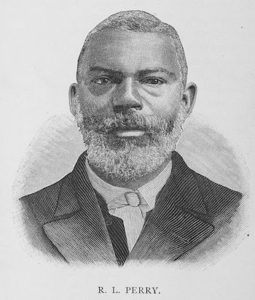
Rufusr Perry
*Rufus Perry was born on this date in 1834. He was a Black educator, journalist, and Baptist minister.
Rufus L. Perry was born a slave on a plantation in Smith County, Tennessee, to Lewis Perry and Maria. Archibald W. Overton owned the family. His father was a talented mechanic, carpenter, and cabinet maker and secured the means to bring his family to Nashville, where Rufus was able to attend the school for free Blacks taught by Sally Porter. Lewis escaped to Canada when Rufus was seven years old, and Rufus was brought back to the plantation, where his education gave him the reputation of being "dangerous."
In August 1852, he was sold to a trader to be taken to Mississippi. However, Perry could forge a pass, and after three weeks, he fled to Windsor, Ontario, Canada. In 1854, Perry converted to the Baptist religion and soon enrolled in the Kalamazoo Seminary in Kalamazoo, Michigan, where he graduated in 1861. On or about October 9, 1861, he was ordained pastor of the Second Baptist Church at Ann Arbor, Michigan. He became a pastor in St. Catherine's, Ontario, and Buffalo, New York. Perry was married to Charlott Perry. They had eight children.
In 1862, Perry and Rev Henry M. Wilson formed the Colored Orphan Asylum of the African Civilization Society to educate and develop African Americans. The organization promoted schools nationwide and founded the Asylum at Weeksville, Brooklyn. Other prominent members included Daniel Payne, Henry Highland Garnet, Rev J. Sella Martin, and Amos N. Freeman. In 1869, Perry was general agent, superintendent of schools, editor of the newspaper, and chairman of the Society's building committee.
The Society closed in 1871, but the orphan asylum, later known as the Howard Colored Orphan Asylum, persisted, and Perry served as its president into the 1880s. Perry became a leader in the Baptist church and a well-known journalist. In his career, he was editor of the Sunbeam, an illustrated children's paper, coordinating editor of the American Baptist, the People's Journal, and publisher of the National Monitor. From about 1877 to 1887, he was the corresponding secretary of the Consolidated American Baptist Missionary Convention and, in 1887, was the corresponding secretary of the American Educational Association and the American Baptist Free Mission Society.
1891, he was elected president of the New England Baptist Missionary Convention. In 1886, he organized the Messiah Baptist Church in Brooklyn. He was also a scholar of classical ethnology and read Hebrew, Greek, and Latin. In 1887, he wrote a text, The Cushite, or the Children of Ham as seen by the Ancient Historians and Poets, which he published as a book in 1893 under the title, The Cushite, Or The Descendants of Ham: As Found in the Sacred Scriptures and in the Writings of Ancient Historians and Poets from Noah to the Christian Era. This work traces the history of black people to a "glorious past." In that way, his work fits the literature that attempts to disassociate nobility or goodness with whiteness. T. McCants Stewart wrote the introduction for the book.
In 1888, Perry was elected president of a national meeting of Baptists, which came to be a union meeting of the General Association of Western States and Territories, the Foreign Mission Convention of the United States, and the American Baptist Missionary Union. A central theme of the conventions was the unity of African American Baptists and the consolidation of several bodies, such as the Colored Missionary Associations and the Co-operation of the American Baptist Missionary Union. In 1892, Perry was among a delegation of Blacks to visit President Benjamin Harrison. After the meeting, Perry declared himself unsatisfied with Harrison, a fellow Republican, because Harrison was not satisfactorily active in ending violence against Blacks in the South.
Perry was awarded a Ph.D. in theology from Kalamazoo Seminary and was granted an honorary Doctor of Philosophy on May 17, 1887, by Simmons College of Kentucky, the day after delivering a commencement lecture, and a Doctor of Divinity by Wilberforce University in 1888. On June 16, 1895, he fell into a coma from a disease complication. Rufus Perry died at his home on the evening of June 18. His funeral was held at Concord Baptist Church in Brooklyn, and his burial was at Cypress Hills Cemetery. The pallbearers were Dr. Amos Harper, T. McCants Stewart, T. Thomas Fortune, Dr. Daniel W. Wisher, Dr. T. Dwight Miller, Dr. R. Watkins, and Rev W. F. Dixon delivered the eulogy.